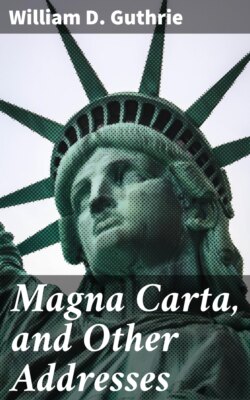Читать книгу Magna Carta, and Other Addresses - William D. Guthrie - Страница 6
На сайте Литреса книга снята с продажи.
Footnote
ОглавлениеTable of Contents
[5] Remarks responding to the toast, "The Mayflower Compact," at the twenty-first annual banquet of the Society of Mayflower Descendants in the State of New York, held at the Hotel St. Regis, New York, November 23, 1915.
[6] Lafcadio Hearn, Kokoro, pp. 289-290.
[7] The original manuscript of the Mayflower Compact has been lost or destroyed. The text, as preserved by Governor Bradford in his annals entitled "Of Plimoth Plantation," is as follows:
"In ye name of God, Amen. We whose names are under-writen, the loyall subjects of our dread soveraigne Lord, King James, by ye grace of God, of Great Britaine, Franc, & Ireland king, defender of ye faith, &c., haveing undertaken, for ye glorie of God, and advancemente of ye Christian faith, and honour of our king & countrie, a voyage to plant ye first colonie in ye Northerne parts of Virginia, doe by those presents solemnly & mutualy in ye presence of God, and one of another, covenant & combine our selves togeather into a civill body politick, for our better ordering & preservation & furtherance of ye ends aforesaid; and by vertue hearof to enacte, constitute, and frame such just & equall lawes, ordinances, acts, constitutions, & offices, from time to time, as shall be thought most meete & convenient for ye generall good of ye Colonie, unto which we promise all due submission and obedience. In witnes wherof we have hereunder subscribed our names at Cap-Codd ye 11. of November, in ye year of ye raigne of our soveraigne lord, King James, of England, France, & Ireland ye eighteenth, and of Scotland ye fiftie fourth. Ano: Dom. 1620." Printed in the Collections of the Massachusetts Historical Society, 4th series, vol. III, pp. 89-90. See also the text in Bradford's History of Plymouth Plantation, ed. W.T. Davis (1908), p. 107.
[8] The legislation against the Quakers as enforced in the Plymouth colony seems to have been essentially political. The records, so far as we have them, indicate that the Quakers were proceeded against because of their attempts to disturb the peace and overthrow established law and order, and not because of their religious beliefs.
[9] Collections of the Massachusetts Historical Society, 4th series, vol. III, pp. 134-136.
